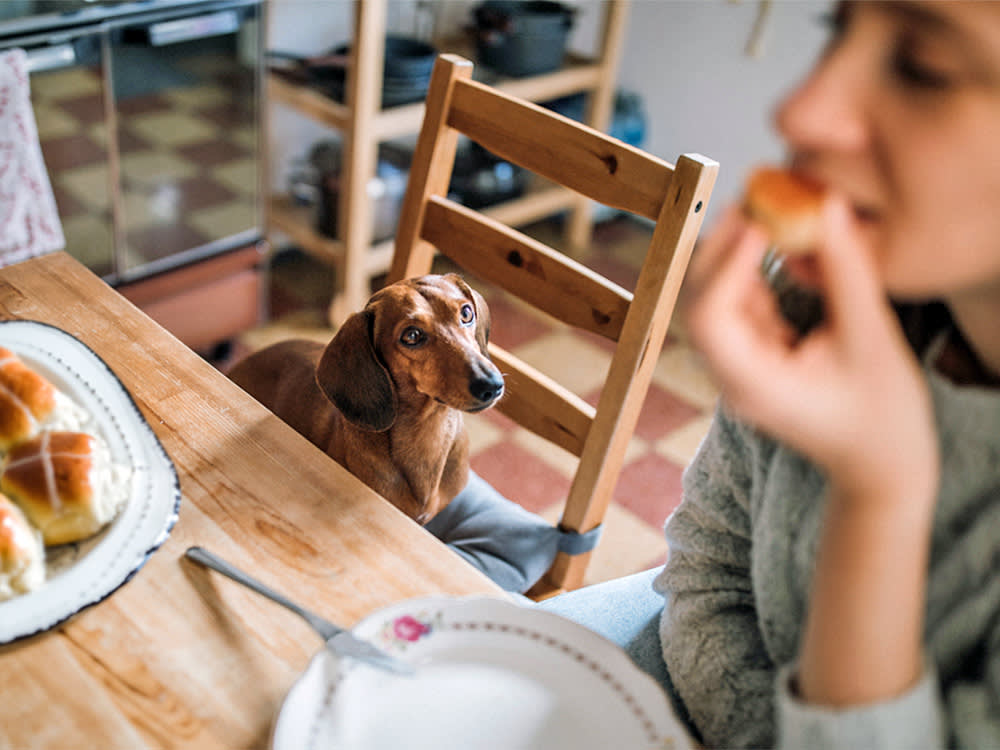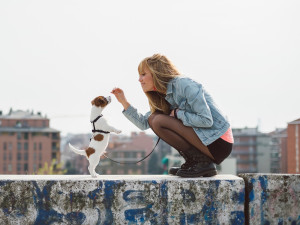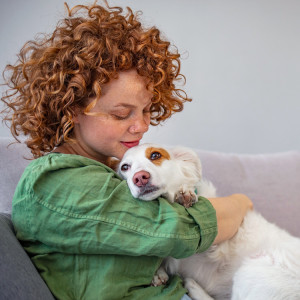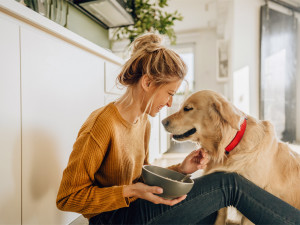Can Dogs Eat Hot Cross Buns?
Sometimes ‘sharing is caring’ isn’t the best advice
With Easter on the horizon, hot cross buns are making their annual return to supermarket shelves across the UK. The sweet, spiced bakes are a seasonal staple many look forward to – but if you’re thinking about letting your dog in on the tradition, it’s worth asking yourself: are hot cross buns safe for dogs?
Recently, BBC Radio 1 presenter Matt Edmondson shared a story that many pet parents will relate to: he and his wife had bought some special hot cross buns as a treat – planning to enjoy them later that afternoon with a proper cup of tea. But when the time came, the buns were gone... All that remained was a trail of crumbs – leading straight to the dog’s bed.
It might seem like a harmless, funny story – and if your dog’s a known food thief, all too familiar – but they’re also lucky it didn’t turn into a more worrying situation (Oscar was his usual self in no time, just a bit full for dinner). Hot cross buns often contain ingredients that are harmful to dogs, even small amounts can lead to serious health issues, including kidney failure in some cases.
Hot cross buns, with their fluffy texture, hints of cinnamon and nutmeg, and, crucially, raisins, pose a potentially hazardous health risk to our four-legged friends. Whilst ‘sharing is caring’ is usually a generous adage to live by, when it comes to dogs and these seasonal sweet treats, there really shouldn’t be any crossover (sorry, not sorry). Find out why you shouldn’t be feeding your pup hot cross buns this Easter.
Nutritional facts: hot cross buns for dogs
One of the primary concerns when it comes to dogs consuming hot cross buns is the inclusion of raisins in the majority of recipes. Raisins, along with their less-wrinkly counterpart, grapesopens in new tab, are well-documented as toxic to dogs. These seemingly ‘healthy’ fruits for humans can lead to severe health issues when ingested by our canine friends.
The toxic component within grapes and raisins that poses a danger to dogs is still not entirely understood by experts. However, what is clear is that even small quantities can have devastating effects on a dog’s health. Symptoms of grape or raisin toxicity can manifest within mere hours of ingestion and may include vomiting, diarrhoea, lethargy and decreased appetite.
In severe cases, ingestion of grapes or raisins by dogs can lead to acute kidney failureopens in new tab, which can be life-threatening if not promptly treated by a veterinarian. Given the potential dangers associated with raisin (as well as current, sultana and grape) consumption, it’s crucial to keep hot cross buns and any other foods containing raisins well out of reach of our furry family members.
Nutmeg, a common spice sometimes added to hot cross buns, contains myristicinopens in new tab, which is harmful to dogs. While small amounts might result in mild stomach upset, larger quantities can lead to more severe symptoms such as increased heart rate, disorientation, abdominal pain, hallucinations and seizures. Nutmeg is unlikely to cause serious toxicity as your pet would need to ingest seriously large amounts, and most recipes only call for a teaspoon or so for a whole batch. That being said, with the combination of nutmeg, cinnamon and raisins in hot cross buns, it's best to avoid them altogether for your dog.
Are hot cross buns good for dogs?
Raisins are a common ingredient in hot cross buns and are extremely toxic to dogs, posing a serious risk to our canine friends. While raisins may seem harmless to us, they can be extremely toxic to dogs. Even in small amounts, raisins and grapes can lead to severe kidney damage and even kidney failure in dogs, leading to dehydration, reduced urine production and even death if left untreated.
Given the potential dangers associated with raisin consumption, it’s crucial to keep hot cross buns, as well as any other foods containing raisins or grapes, well out of reach of your canine companions. Even a small nibble could have serious consequences for your furry friend, so you should always get them to the vet as soon as possible, even if it doesn’t look like any symptoms have started yet.
Can dogs eat other buns?
Hot cross buns might present a clear risk to dogs due to their raisin content, what about other types of bun or bread products? Generally, plain bread itself is not harmful to dogs in moderation but other baked goods, including various sweet treats, may contain ingredients that are harmful or even toxic to dogs.
For example, certain artificial sweeteners, such as xylitol, commonly used in baked goods as a sugar substitute, can be extremely dangerous for dogs. Xylitol consumption can lead to a rapid release of insulin in dogs, causing a dangerous drop in blood sugar levels (hypoglycaemia). In severe cases, xylitol toxicity can result in liver failureopens in new tab and even death.
Are hot cross buns completely safe for dogs?
No, not at all. Given the dangers of raisin toxicity in dogs and the potential for severe health consequences, it’s crucial for pet owners to err on the side of caution and avoid feeding hot cross buns or any other foods containing raisins to their canine companions.
Additionally, the high fat contentopens in new tab in many baked goods (even those without raisins) can pose a risk of pancreatitis, a painful and potentially life-threatening inflammation of the pancreas in dogs. Symptoms of pancreatitis may include vomiting, diarrhoea, abdominal pain and lethargy.
When it comes to sharing baked goods with your canine companion, it’s always best to err on the side of caution and avoid feeding them any foods that contain ingredients known to be harmful to dogs. Instead, opt for dog-safe treats specifically formulated for canine consumption.
The bottom line: can dogs eat human foods?
While dogs can eat many foods intended for human consumption, raisins in hot cross buns are a good example of why it is always important to double-check ingredients labels; many human foods can be safe for dogs in small amounts, but grapes and raisins are definitely not one of them.
Your dog should be receiving all the nutrients they need from a complete and balanced diet but dog-friendly snacks can be offered as a bonus – treats (including human foods) should make up less than 10 percent of your dog’s daily calorie intake.
What are some human foods that are safe for dogs?
Apples, kiwis and blueberries are good examples of safe and healthy fruits to share with your pup.
Celery is also a good choice.
Eggs can be a high-protein option for your pup.
What are other human foods that are dangerous for dogs?
Chocolate and coffee are toxic to dogs and should always be avoided, too.
Onions and garlic can cause toxicity in dogs, symptoms include vomiting, loss of appetite and diarrhoea.
While some cheeses are OK in small amounts, you shouldn’t share too much dairy with your dog.
References:
Cortinovis, Cristina, and Francesca Caloni. “Household Food Items Toxic to Dogs and Cats.opens in new tab” Frontiers in Veterinary Science, vol. 3, Mar. 2016.
Cridge, Harry, et al. “New Insights into the Etiology, Risk Factors, and Pathogenesis of Pancreatitis in Dogs: Potential Impacts on Clinical Practice.opens in new tab” Journal of Veterinary Internal Medicine, vol. 36, no. 3, May 2022, pp. 847–64.
Schmid, Renee D., and Lynn R. Hovda. “Acute Hepatic Failure in a Dog after Xylitol Ingestion.opens in new tab” Journal of Medical Toxicology, vol. 12, no. 2, Dec. 2015, pp. 201–5.
Schweighauser, Ariane, et al. “Toxicosis with Grapes or Raisins Causing Acute Kidney Injury and Neurological Signs in Dogs.opens in new tab” Journal of Veterinary Internal Medicine, vol. 34, no. 5, Sept. 2020, pp. 1957–66.
Flint, DVM, Charlotte, and Catherine Angle, DVM. “Nutmeg and Cinnamon Toxicity.opens in new tab” Pet Poison Helpline, 27 Nov. 2013.






